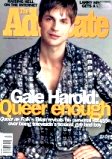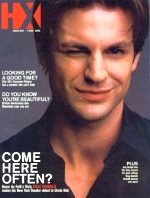 Queer
as Folk’s feisty Gale Harold takes aim against homophobia, fame, and critics
of his character, Brian
Queer
as Folk’s feisty Gale Harold takes aim against homophobia, fame, and critics
of his character, BrianNews - Feature Stories - Magazine - Gale Harold
Gale Force
 Queer
as Folk’s feisty Gale Harold takes aim against homophobia, fame, and critics
of his character, Brian
Queer
as Folk’s feisty Gale Harold takes aim against homophobia, fame, and critics
of his character, Brian
By Michael Rowe
From The Advocate, February 5, 2001
The tall, slender man locking his bicycle outside an unpretentious Toronto restaurant is wearing a fedora tilted down over his eyes in a way that suggests a desire for great distance, as though a veil of inviolability has been drawn about him like an invisible cloak. On someone else, the hat might be a bohemian affectation. For 32-year-old actor Gale Harold, it’s a practical strategy. Anonymity—or inviolability, for that matter—has become a rare commodity in the 13 months since his character, Brian Kinney, the gay white shark of Showtime’s Queer as Folk, seared himself into gay consciousness and pop culture.
If Harold could mark off more private territory—for instance, never do another celebrity profile—he would. Questions about what it’s like to be a straight man playing gay or what it feels like to be so handsome exasperate him beyond distraction. He doesn’t like fame or trust its motivation.
 “I’m grateful for the attention,” he says of his fans’ devotion, “because it validates that I’m doing something.” But even as he says this, Harold points out that it sounds like something hundreds of overexposed celebrities have already said. Ãs he talks, reaching past the conventions of celebrityspeak for something truer, you begin to realize that if you thought this man was just some diva of the month, you could not be more wrong.
“I’m grateful for the attention,” he says of his fans’ devotion, “because it validates that I’m doing something.” But even as he says this, Harold points out that it sounds like something hundreds of overexposed celebrities have already said. Ãs he talks, reaching past the conventions of celebrityspeak for something truer, you begin to realize that if you thought this man was just some diva of the month, you could not be more wrong.
“Gale has very strong opinions, and he’s very political,” says Queer as Folk executive producer Ron Cowen, with no small measure of pride. “Sometimes I think he’s the smartest person I’ve ever met. I know a lot of smart, well-educated, well-read people. But there’s something about Gale where it takes a leap from education or keen intelligence to some other place. Genius is a cheap word, especially in Hollywood. But he’s really smart.”
Inside the restaurant, the waiter has brought him a cup of tea, and we have ordered lunch. “How could I not be ambivalent?” Harold says, talking about his new fame. (He’ll reluctantly, and with some humor, accede to being a “semi–junior league star.”) “If being famous means that you get to work on great projects all the time, with great people, then my idea of fame may include that. But,” he says with distaste, “it doesn’t necessarily include—fame.”